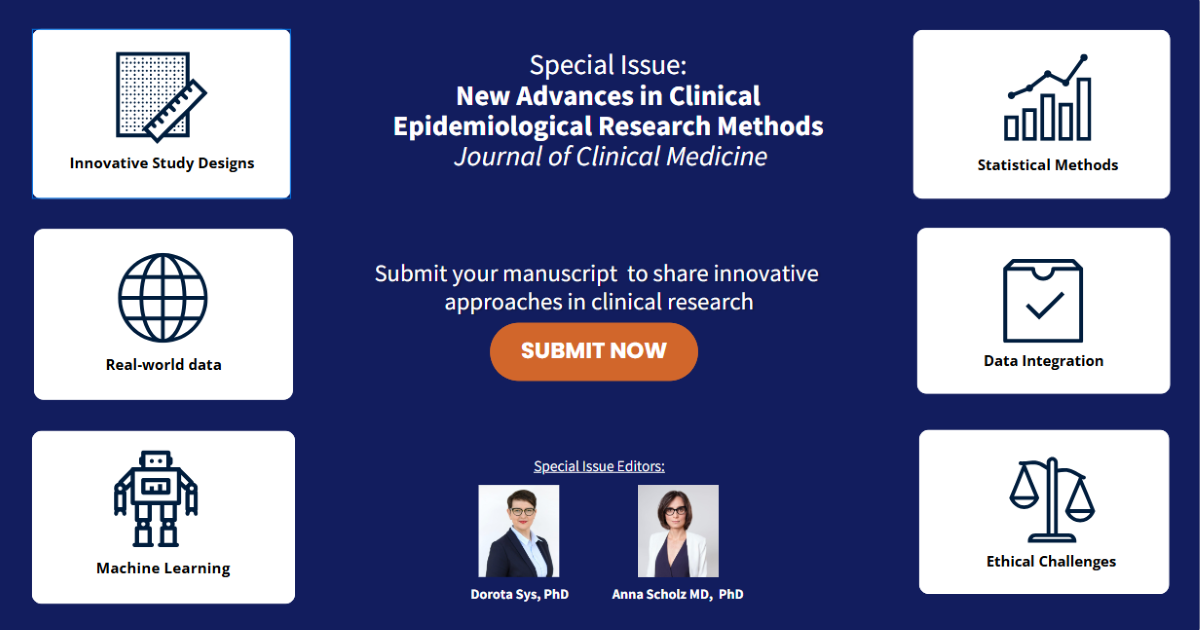New Advances in Clinical Epidemiological Research Methods
A special issue of Journal of Clinical Medicine (ISSN 2077-0383). This special issue belongs to the section "Clinical Research Methods".
Deadline for manuscript submissions: 20 March 2026 | Viewed by 1010

Special Issue Editors
Interests: research methodology; reproductive health; clinical epidemiological research methods
Special Issue Information
Dear Colleagues,
Clinical epidemiology stands at the intersection of methodological rigor and practical application in patient-centered research. Recent years have brought about remarkable developments in study designs, analytical approaches, and data integration techniques, including real-world data, artificial intelligence, and causal inference frameworks. These innovations are transforming how we investigate disease etiology, assess interventions, and inform clinical decision-making.
This Special Issue aims to highlight cutting-edge methodological advances that enhance the validity, transparency, and relevance of clinical epidemiological research. We welcome submissions focusing on the following areas:
- Novel study designs in observational and interventional research;
- Real-world data in epidemiological research;
- Advanced statistical and computational methods;
- Approaches to bias control and confounding adjustment;
- Integration of multi-source data (e.g., electronic health records, registries, and omics);
- Applications of machine learning in clinical research;
- Reproducibility and reporting standards;
- Ethical and regulatory challenges in modern epidemiological practice.
By showcasing methodological innovation across diverse clinical areas, we hope to stimulate interdisciplinary dialogue and promote best practices in clinical epidemiology.
We look forward to your contributions to this Special Issue.
Dr. Dorota Sys
Dr. Anna Scholz
Guest Editors
Manuscript Submission Information
Manuscripts should be submitted online at www.mdpi.com by registering and logging in to this website. Once you are registered, click here to go to the submission form. Manuscripts can be submitted until the deadline. All submissions that pass pre-check are peer-reviewed. Accepted papers will be published continuously in the journal (as soon as accepted) and will be listed together on the special issue website. Research articles, review articles as well as short communications are invited. For planned papers, a title and short abstract (about 250 words) can be sent to the Editorial Office for assessment.
Submitted manuscripts should not have been published previously, nor be under consideration for publication elsewhere (except conference proceedings papers). All manuscripts are thoroughly refereed through a single-blind peer-review process. A guide for authors and other relevant information for submission of manuscripts is available on the Instructions for Authors page. Journal of Clinical Medicine is an international peer-reviewed open access semimonthly journal published by MDPI.
Please visit the Instructions for Authors page before submitting a manuscript. The Article Processing Charge (APC) for publication in this open access journal is 2600 CHF (Swiss Francs). Submitted papers should be well formatted and use good English. Authors may use MDPI's English editing service prior to publication or during author revisions.
Keywords
- clinical epidemiology
- research methodology
- observational studies
- causal inference
- real-world data
- machine learning
- bias control
Benefits of Publishing in a Special Issue
- Ease of navigation: Grouping papers by topic helps scholars navigate broad scope journals more efficiently.
- Greater discoverability: Special Issues support the reach and impact of scientific research. Articles in Special Issues are more discoverable and cited more frequently.
- Expansion of research network: Special Issues facilitate connections among authors, fostering scientific collaborations.
- External promotion: Articles in Special Issues are often promoted through the journal's social media, increasing their visibility.
- Reprint: MDPI Books provides the opportunity to republish successful Special Issues in book format, both online and in print.
Further information on MDPI's Special Issue policies can be found here.






